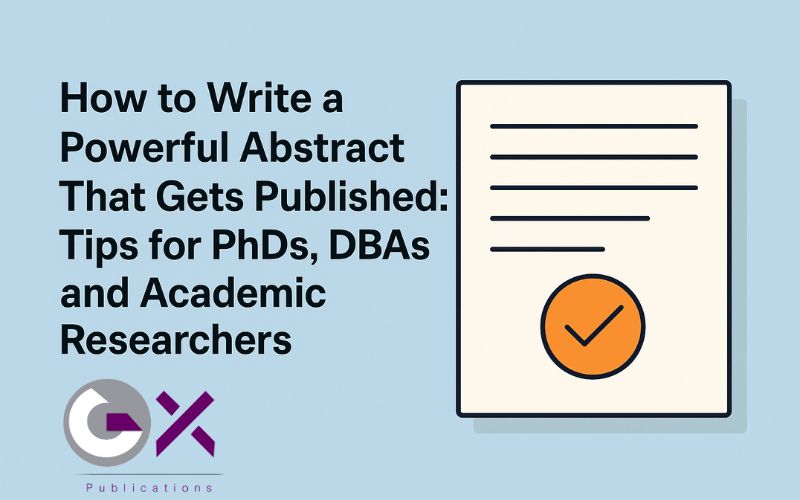How to Write a Powerful Abstract That Gets Published: Tips for PhDs, DBAs, and Academic Researchers

Strong 8k brings an ultra-HD IPTV experience to your living room and your pocket.
Your abstract is the first journal editors and readers encounter. If it doesn't impress, your research can be skipped—even when it's good. That’s why writing a clear and focused abstract matters.
For PhDs, DBAs, professors, and researchers aiming to publish, the abstract plays a big role. It's more than a summary. It indicates what your paper is about, why it is significant, and what people can learn from it.
A good abstract helps your paper get accepted. It also helps people find your work in search engines and databases.
At GlobalX Publications, we work with academic authors from many fields. We have observed that well-crafted abstracts frequently result in greater exposure, greater citation, and quicker publication.
Below, we're going to step you through easy, practical guidelines to make your abstract effective. Whether submitting a journal article, thesis, or conference paper—this will serve to get noticed.
What Makes an Abstract “Publish-Worthy”?
A good abstract guides readers and journal editors to determine whether your research is worth reading. For researchers, professors, PhDs, and DBAs, a good abstract can lead to academic publication.
Here’s what makes it stand out:
• Clear purpose
Say what your research is about in the first few lines. Keep it short and to the point.
• Straightforward structure
Include your main question, how you did your research, key results, and what those results mean.
• Plain language
Avoid difficult words. Keep it simple so more people can understand your work.
• Right fit for the journal
Make sure your abstract matches the journal’s focus and style.
• No extras
Don’t add quotes, citations, or unnecessary details.
• Use real keywords
Choose words people would type into search engines when looking for research like yours. This helps your paper show up in searches.
A strong abstract is your first step toward getting published with platforms like GlobalX Publications. Invest the time writing it well—revise, read it aloud, and get someone else to review it before you submit.
Types of Abstracts in Academic Publishing
When submitting a research paper or thesis, the abstract is often the first thing editors read. Knowing the right type to write can help your work stand out and get published.
There are two main types of abstracts used in academic publishing:
• Descriptive Abstracts
These give a quick summary of the purpose and scope of your work. They don’t include details like results or conclusions. They’re short—usually around 100 words.
• Informative Abstracts
These are more common in journals. They cover your research question, methods, key results, and conclusion. Informative abstracts are longer—usually 150 to 250 words.
Abstracts can also be:
• Structured
These follow clear headings like Background, Methods, Results, and Conclusion. Journals in science and business often use this type.
• Unstructured
These are written as one paragraph without headings. They’re more common in the arts or social sciences.
Choosing the right type depends on your field and the journal's rules.
At GlobalX Publications, we help PhDs, DBAs, and researchers write strong abstracts that meet academic journal standards.
Key Components of a Strong Abstract
A good abstract provides the reader with a brief perception of your research. Editors tend to read it first to determine if your work is appropriate for their journal. Below are the main elements to include:
• Background
Start by briefly stating what your topic is about. Why does it matter?
• Research Problem or Question
Clearly say what question you tried to answer or what problem you looked at.
• Method
In one line, explain how you did your study. What tools or approach did you use?
• Main Findings
Share your key result. What did you discover or learn?
• Conclusion or Implication
End by saying what your results mean. How can they help others in your field?
Keep it short and clear. Use simple words. Avoid quotes, references, or too much detail. Stick to 150–250 words unless your journal says otherwise.
Your abstract should stand on its own. Someone should understand your full research just by reading it. Think of it as a mini version of your paper.
Use keywords that match your topic. This helps more people find your work online.
Write it last, when your full paper is ready. That way, you won’t miss anything important.
Common Mistakes to Avoid
Composing an abstract is easy, but neglecting tiny details can deny you a chance at publication. Here are typical errors researchers commit—and how to avoid them:
• Too much jargon: Keep it clear. If readers don’t understand your words, they’ll move on. Use everyday language.
• Being too vague or too detailed: Don't make it a mystery, and don’t try to explain everything. Say what your research is about, how you did it, and what you found.
• No clear message: Your abstract should tell a story. Readers should know the topic, purpose, method, and result in one short read.
• Adding citations or references: Abstracts are short summaries. Leave out source names and numbers.
• Missing keywords: Journals and databases use keywords to help others find your work. Add the right terms without stuffing them in.
• Not following word limits: If the journal asks for 250 words, don’t write 300. Stick to the rules.
• Skipping proofreading: Spelling and grammar mistakes make your work look rushed.
Avoiding these mistakes makes your abstract easier to read and publishable. Keep it simple, concise, and to the point.
Tips from Editors and Published Authors
Editors and published authors read hundreds of abstracts. They know what makes one stand out.
Here’s what they suggest:
• Be clear fast
Start strong. Explain what your research is about in the first line. Don’t build up slowly.
• Stick to the point
Avoid extra details. Focus on your main goal, method, result, and why it matters.
• Use simple words
Don’t try to sound clever. Use words that everyone can understand.
• Match the journal style
Read a few abstracts from the journal you want to submit to. Follow their tone and format.
• Avoid long sentences
Break ideas into short, clear lines. One idea per sentence works best.
• Choose your keywords wisely
Use the words that people would search to find your work. This helps your article appear in search results.
• Ask for feedback
Share your abstract with someone who has published before. Fix what they point out.
Good abstracts are short, clear, and easy to read. Editors notice when you keep things simple and strong.
SEO & Discoverability: Why Keywords Matter in Your Abstract
When one searches the web for research, one enters keywords such as "climate change study" or "business strategy in Asia." Your paper is more likely to appear on searches if your abstract has the correct words.
That is why selecting the correct keywords matters. It causes your work to be discovered on platforms such as Google Scholar, Scopus, and Web of Science.
Here’s how to do it:
• Pick 3–5 clear keywords that match your topic
• Use simple words that people are likely to search for
• Place those keywords naturally in your abstract
• Don’t repeat them too much—once or twice is enough
• Avoid long phrases or uncommon terms
Consider how someone would look for your paper. If you had written about MBA studies online, good keywords could be: "online MBA," "distance learning," "higher education," and "business education."
Good keywords assist journals in labeling your paper appropriately. That way, it becomes simpler for other people to locate and read your paper.
Strong keywords do more than back up your study—they spread it to the entire world.
Examples of Effective Abstracts in Different Fields
Looking at real examples helps make abstract writing easier. Here are four short and clear abstracts from different fields to guide you.
1. Business Administration (DBA)
Topic: Remote Work and Team Productivity
This study looked at how remote work affects team output in mid-sized companies. Data came from surveys with 200 managers. Results showed that teams with set goals and regular check-ins performed better. The research shows simple structures can help remote teams stay on track.
2. Education
Topic: Online Learning in Rural Schools
This paper explored how online classes worked in five rural schools. Interviews with students and teachers showed tech problems and lack of training were big issues. But students liked the flexible timing. The study gives ideas for making online classes easier to use in small towns.
3. Social Sciences
Topic: Social Media and Teen Mental Health
The research studied 300 teenagers to see how social media affects their mood. Teens who spent over four hours daily showed higher signs of stress. The study points to a link between too much screen time and anxiety. It suggests shorter online time may help.
4. Technology
Topic: Using AI to Grade Essays
This project tested if AI can grade school essays well. It compared scores from teachers and AI tools. The results showed a 90% match. The study says AI can save time for teachers but needs checking for bias.
These examples show how to keep abstracts short, clear, and useful—across any field.
Final Checklist Before Submission
Before you send your abstract to a journal or publisher, use this quick checklist to make sure it's ready:
• Word Count: Keep it between 150–300 words. Check the journal’s exact limit.
• Clear Focus: Does it explain the purpose, method, key results, and conclusion?
• Simple Words: Avoid long or complex terms. Make sure anyone in your field can understand it.
• No Extra Details: Don’t add data, citations, or background stories. Stick to the main idea.
• Journal Guidelines: Every journal has its own rules. Follow them closely.
• Grammar and Flow: Read it out loud. Fix awkward lines and grammar slips.
• Proofread: Check for typos and repeated words.
• Feedback: Ask a peer or mentor to review it. A second pair of eyes helps.
• Strong Start and End: The first line should hook interest. The last line should wrap it up.
• Keywords: Use 3–5 strong academic keywords to improve visibility in search engines.
This checklist helps your abstract stand out and gets your paper one step closer to being published.
Conclusion
A good abstract will get your research seen. It's usually the first thing an editor and reviewer will read. If it is concise and well-focused, it can make you a candidate for publication.
Do it carefully. Write it clearly. Use ordinary words. Describe what your research does, why it is important, what you learned, and what it implies. Keep it brief but thorough.
Before you submit:
• Check if the journal has a word limit.
• Make sure your abstract matches what’s in your paper.
• Avoid big claims you can’t prove.
• Ask someone to review it.
Your abstract is not just a summary. It’s your pitch to the world. Whether you’re a PhD student, professor, or early-career academic, this part matters.
If you’re ready to publish your research, GlobalX Publications offers the right support to help you reach global readers.
Note: IndiBlogHub features both user-submitted and editorial content. We do not verify third-party contributions. Read our Disclaimer and Privacy Policyfor details.







